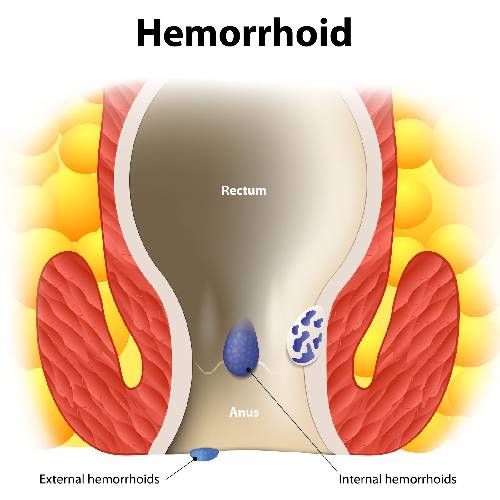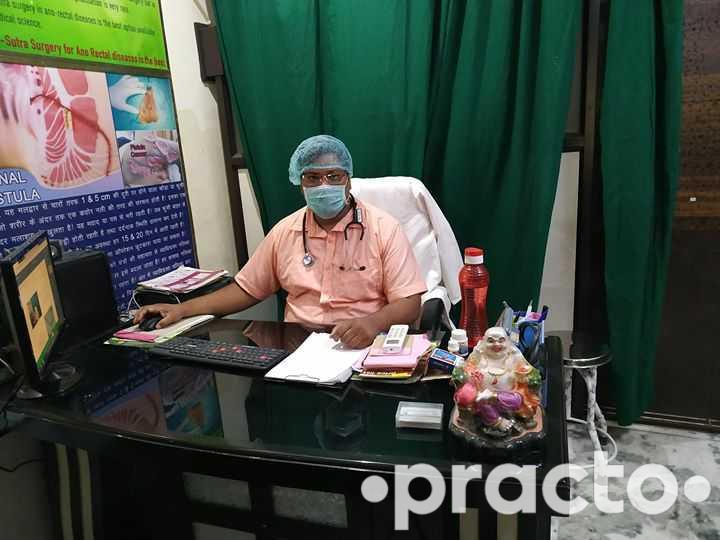
Contents
In this article we will look at:
- What is piles?
- Who are the right specialists for performing Piles Surgery?
- What is the cost of Piles Surgery?
- How does piles occur?
- Who is prone to piles?
- What are the causes of piles?
- What are the symptoms of piles?
- How is piles diagnosed?
- What are the complications of piles?
- What is the treatment for piles?
- In The Spotlight - Latest news on piles
You can click on any of the links above to navigate to the section of your interest.
What is piles?
Piles are swellings or swollen haemorrhoids that occur inside and around the anus, and along the anal canal. Haemorrhoids are masses, clumps, cushions of tissue full of blood vessels, support tissue, muscle and elastic fibers in the anal canal.
Everyone has haemorrhoids. However, when the haemorrhoids guarding the anal passage become too big due to inflammation, so that the vein walls become stretched, thin, and irritated by passing bowel movements, that is when piles develops.
In most cases, piles goes away on its own.
Piles can be broadly classified into two categories:
Internal Piles - are located far within the rectum, and can’t be seen or felt. The only symptom is usually bleeding.
Internal piles can be classified into 4 grades:Grade1: These are tiny haemorrhoids within the lining of the anus.
Grade 2: These haemorrhoids too lie within the anus and are slightly larger than grade 1 haemorrhoids. These haemorrhoids may get pushed out while passing stool but return to the original position on their own.
Grade 3: These are also known as 'prolapsed haemorrhoids'. They appear outside the anus. The patient can push them back in by pressing against them with his fingers.
Grade 4: These haemorrhoids cannot be pushed back and stay outside the anus at all times. They need to be treated by a doctor who usually suggests a surgery.
External Piles - are located around the anus right under the skin, where there are many pain-sensing nerves. They, therefore, hurt as well as bleed.
Anyone at any age can be affected by piles. Though it has been observed that people over 45 years of age usually get affected by piles.
About 50% of people experience this condition at some time in their life. Women who are pregnant too experience it. Though it is not clear what causes haemorrhoids, researchers think this might be an inherited condition of weak veins or varicose veins leading to haemorrhoids.
Who are the right specialists for performing Piles Surgery?
You can find a list of top Piles Surgery doctors & centers in your city at the following links:
Top Piles Surgery doctors in Bangalore
Top Piles Surgery doctors in Hyderabad
Top Piles Surgery doctors in Delhi
Top Piles Surgery doctors in Mumbai
Top Piles Surgery doctors in Pune
Top Piles Surgery doctors in Chennai
Top Piles Surgery doctors in Gurgaon
What is the cost of Piles Surgery?
Piles surgery cost varies based on location and hospitals.
You can find more information on Piles Surgery cost in your city at the following links:
Cost of Piles Surgery in Bangalore
Cost of Piles Surgery in Hyderabad
Cost of Piles Surgery in Delhi
Cost of Piles Surgery in Mumbai
Cost of Piles Surgery in Chennai
Cost of Piles Surgery in Gurgaon
How does piles occur?
Haemorrhoids are masses, clumps, cushions of tissue full of blood vessels, support tissue, muscle and elastic fibers in the anal canal. Piles are haemorrhoids that have become inflamed.
Internal haemorrhoids form when blood vessels inside the rectum become swollen and engorged.
External haemorrhoids can occur due to increased pressure caused by obesity, pregnancy, sitting or standing for long hours at a stretch, straining on the toilet, coughing, sneezing, vomiting, and holding your breath while straining to do strenuous physical labour.
Don't wait or self medicate.
See a doctor now
Who is prone to piles?
Some people are more prone to developing piles than others. There could be a variety of reasons for it:
genetic predisposition to piles, meaning weak veins can be genetic leading to weak rectal vein walls or week venous valves
less fiber in the diet can cause constipation which can lead to the formation of piles
poor bathroom habits
pregnancy
excessive coughing or sneezing
constant sitting or standing for long hours at a stretch
excessive straining, rubbing or cleaning around the anus
regularly holding breath while straining to perform some physical labour
being obese
What are the causes of piles?
The primary causes of piles include:
genetic predisposition to piles
lack of fiber in the diet
inadequate fluid intake
sedentary lifestyle
stress
straining while passing stool
constipation and diarrhea
constant sitting or standing for long hours at a stretch
sitting for long periods of time on the toilet
anal intercourse
pregnancy
constant heavy lifting
being obese
previous surgery of bowel
constriction of intestine following a surgery
spinal cord injury that leads to bladder and rectal dysfunction
dysfunction of the floor of pelvis
What are the symptoms of piles? How is piles diagnosed?
The symptoms of piles include:
bright red bleeding from the anus. Blood may streak the bowel movement or the toilet paper.
pain during bowel movements
painful swelling or a lump near the anus
anal itching
mucous discharge from the anus
hard lump around the anus
area around the anus becomes red and sore
Diagnosis
If the doctor suspects you have piles, he will perform a visual examination of your anus to diagnose haemorrhoids. He may also perform a digital rectal exam to check any sign of piles within the anus.
The doctor may also prescribe an additional test called a sigmoidoscopy.
A sigmoidoscopy (a small fibre-optic camera) involves your doctor using a small camera to diagnose an internal haemorrhoid. The sigmoidoscope is fitted into a small tube and inserted into your rectum.
It provides a clear view of the inside of your rectum and displays the abnormalities if any within the rectum. The doctor may also prescribe other tests such as colonoscopy, anoscopy, and proctoscopy which can clearly show internal haemorrhoids if any.
What are the complications of piles?
The complications of piles include:
bleeding during bowel movements
pain during bowel movements
piles cause complications associated with hygiene, as the anal area becomes difficult to clean after defecation
poor hygiene around the anal area can lead to several infections
itchiness around the anal area
gangrene, if the blood supply to an internal haemorrhoid is cut off
What is the treatment for piles?
Medical Treatment
Piles often clear up on their own but may require treatment or even surgery if the symptoms are severe.
The treatment of piles varies for internal and external piles.
Grade one, and two, of internal haemorrhoids, is usually treated with medicine and a planned diet of fibrous non-spicy food. In some cases, the doctors may also prescribe a topical cream.
Grade three of internal haemorrhoids is also treated with medicine and a change of diet but may require surgical intervention if the symptoms are severe. Treatment of grade four internal piles requires prompt surgical intervention especially if gangrenous tissue is found.
To treat external piles your doctor might suggest hemorrhoid creams, or ice packs to reduce the swelling. If the case is too severe, the doctor may suggest surgery which can include:
removal of haemorrhoids
using an infrared photo, laser, or electrical coagulation to burn tissue affected by piles
sclerotherapy to eliminate varicose veins which could be the cause of piles
Exercise
Exercising can easily reduce the symptoms of piles. You can go for exercises such as :
brisk walking
deep breathing exercises
stretching exercises
aerobics
kegel exercises 3 times everyday - the steps for which are:
contracting your pelvic muscles. It is akin to the action you do when you hold urination.
squeeze and hold for three seconds then relax for another 3 seconds.
repeat the exercise 10 times each session, until you can do as many as 15 repetitions.
In The Spotlight
Here are some of the latest news on piles/haemorrhoids from around the world:
- Piles: Four symptoms of painful haemorrhoids
- Some tips for help with hemorrhoid pain
- Hemorrhoids during pregnancy
- Natural Home Remedies For Blood In Stool, Hemorrhoids
- Next Gen Pharma Launches Roidosanal for Treatment of Haemorrhoids, Backed with Clinical Studies
- The piles factor: Youth at increased risk due to sedentary urban life
- 5 everyday habits that are giving you hemorrhoids
Patient Experiences






Questions answered by trusted doctors

In this technique, a specially prepared thread is used to cure diseases. Kshar Sutra acts by "Herbal Chemical Cauterisation" and removes the disease from the body.

We have many good homeopathic medicines for piles or haemorrhoids to treat it completely from the root itself without any sideffects that are part of conventional medicines
Please contact me directly or ask me at dramisha.com
Online consultation and medicines at your doorstep are also delivered nationally and internationally
Warm regards
Dr Amisha Mirchandani
09819 055014

Don't use dry toilet paper. To help keep the anal area clean after a bowel movement, use moist towelettes or wet toilet paper that doesn't contain perfume or alcohol.
Apply cold. Apply ice packs or cold compresses on your anus to relieve swelling.
With these treatments, hemorrhoid symptoms often go away within a week. See your doctor if you don't get relief in a week, or sooner if you have severe pain or bleeding.
Consult surgeon....

Did you know?
Constipation can lead to piles
According to a survey 14% people in urban India suffer from chronic constipation which can lead to piles.
People with chronic constipation are prone to piles
65% of the people with chronic constipation did not pass motion for three or more consecutive days.
People between 45 years to 65 years are prone to piles
20% (two out of 10) people in the age group of 45 to 65 suffered from chronic constipation with symptoms of piles.
Related videos
Related articles
Gastritis is an inflammation and erosion of the stomach lining, due to bacterial infection, certain pain killers, drinking too much alcohol, very spicy food. Know more about Gastritis, its causes, symptoms, treatment videos on Health-Wiki | Practo.
Nosebleeds tend to be very common. They might be scary at times.
Rheumatoid Arthritis is a chronic autoimmune disease. Find more about the treatment, home remedies, reviews and queries on rheumatoid arthritis on Health-Wiki | Practo




If required laser treatment or conservative treatment
Call us
Www.harilaserclinics.com
I can understand your problem. First of all you need to consider the following points to be out of pain and out of the whole situation.
1. Drink lots of water.
2. Have a high fiber diet.
3. Avoid oily and spicy foods.
4. Lose weight if you are overweight.
5. Don't sit for long durations.
6. Have small meals frequently rather than having huge amount of foods at one time.
7. Inculcate the habit of walking around for time time after dinner.
8. Avoid smoking and alcohol.
9. Have a bowl of curd everyday.
10. You could sit in a tub of hot water to which a antiseptic like dettol is added when you get pain.
If you do as per the above mentioned advice, you will be avoiding the whole situation of piles. But if it still persists, consult a surgeon in person for further help.
Regards